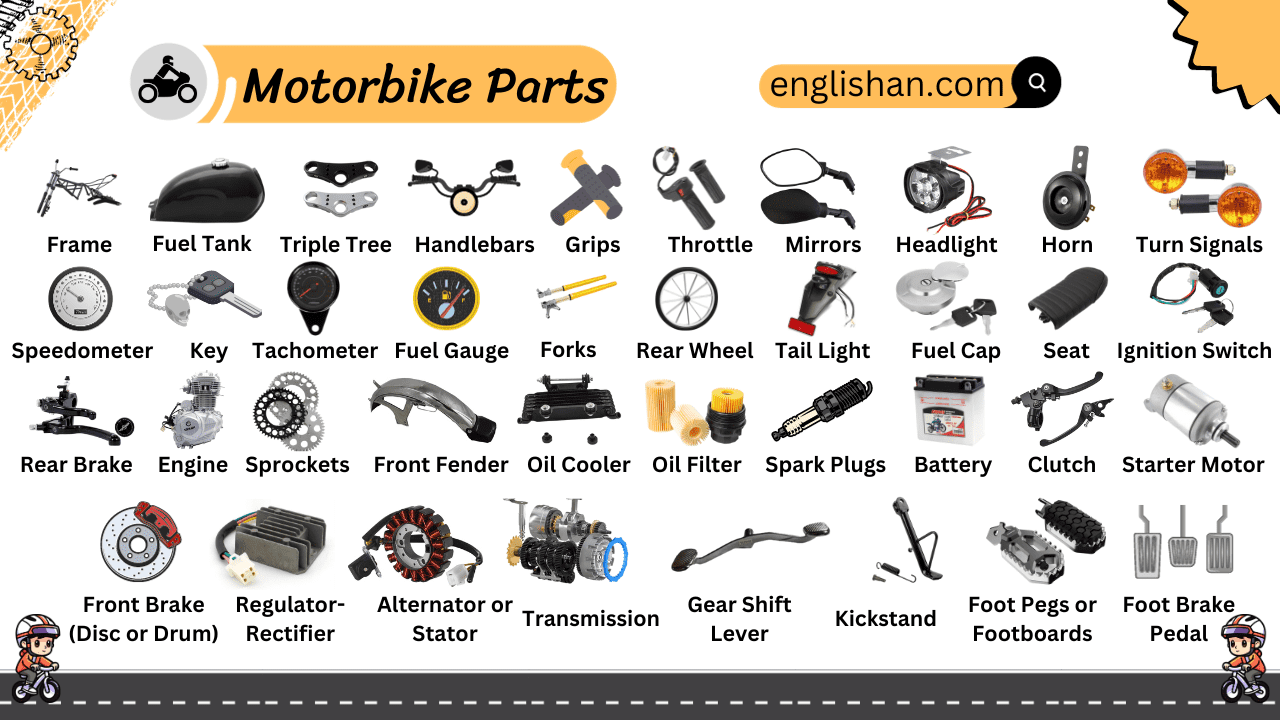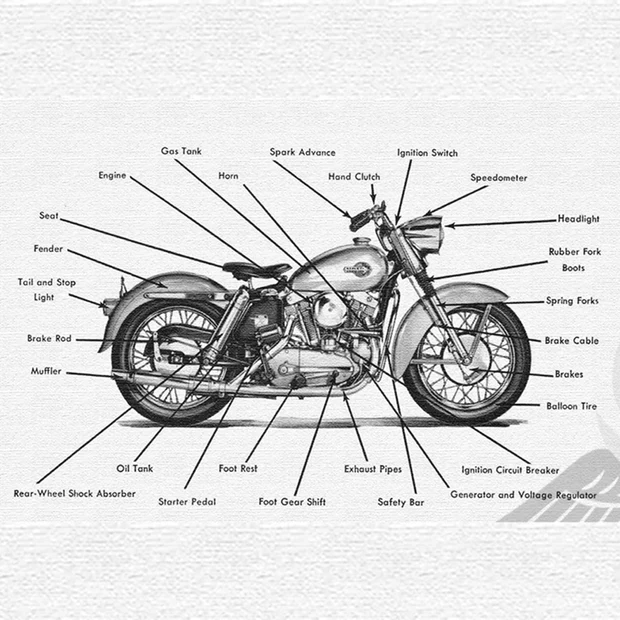Tips for Buying Trusted Bike Parts Wellington Online Without Regret
Tips for Buying Trusted Bike Parts Wellington Online Without Regret
Blog Article
Discover the Essential MotorBike Parts You Required for Optimum Performance
Recognizing the vital parts of a motorcycle is essential for achieving peak efficiency. Each element, from the engine to the braking system, plays a crucial role in overall performance and security. Regular maintenance can avoid unexpected failings and boost the riding experience. Numerous riders neglect the ins and outs of these systems. Finding how they function together can result in an extra effective experience. What vital elements should every motorcyclist focus on?
The Engine: The Heart of Your Bike
The engine functions as the core component of a motorcycle, driving its efficiency and specifying its capabilities. It is accountable for converting fuel right into power, which powers the bike forward. Different kinds of engines are employed, consisting of single-cylinder, V-twin, and inline configurations, each offering distinctive attributes matched for different riding objectives and styles. The engine dimension, commonly gauged in cubic centimeters (cc), significantly influences efficiency, with larger engines generally supplying even more power and torque.Furthermore, the engine's style and technology, such as fuel shot systems or air-cooling versus liquid-cooling, impact performance and integrity. Upkeep is necessary for peak operation; factors like regular oil modifications and checking trigger connects assurance long life. Motorcyclists often think about an engine's responsiveness and level of smoothness, as these qualities improve the total riding experience. Eventually, the engine stays an essential component that specifies not just the bike's efficiency but additionally the motorcyclist's connection to the machine.
The Transmission: Moving Gears Efficiently
The transmission plays an essential role in a motorbike's performance, particularly in the auto mechanics of equipment shifting. Recognizing exactly how to shift equipments smoothly can enhance the overall riding experience, while normal upkeep guarantees peak capability. Appropriate focus to these facets can considerably impact the durability and effectiveness of the motorbike.

Equipment Shifting Mechanics
Smooth gear shifting is vital for perfect motorbike performance, considerably influencing both acceleration and control. The mechanics of gear moving entail the interaction between the clutch, gear lever, and transmission system. When a motorcyclist engages the clutch, it disengages the engine from the transmission, enabling a gear modification without harming the components. A well-timed release of the clutch, integrated with precise activity of the equipment bar, promotes a seamless modification in between equipments. This process assures that the engine operates within its finest power band, improving efficiency. Bike Parts Wellington. Additionally, understanding the gear proportions and their effect on speed and torque can aid bikers make informed selections during shifts, inevitably adding to an extra responsive and enjoyable riding experience
Upkeep Tips Relevance
Routine maintenance plays an important function in assuring that the transmission system runs efficiently, enabling for smooth gear shifts. On a regular basis changing the transmission and inspecting fluid is vital, as old fluid can lead to raised friction and wear. Additionally, examining the clutch for wear warranties peak interaction and disengagement, avoiding slippage during gear adjustments. Lubrication of moving parts is similarly crucial to lower friction and improve performance. Motorcycle proprietors must also keep an eye on for leaks and uncommon noises, as these can indicate underlying issues. By sticking to these maintenance pointers, riders can lengthen the life-span of their transmission system, assuring that equipment shifts continue to be smooth and adding to the total efficiency of their motorbike.
The Braking System: Ensuring Security on Every Experience
Braking systems are basic elements that directly affect a motorcycle's safety and security and performance. They are composed of various components, consisting of brake pads, rotors, calipers, and hydraulic lines, all interacting to guarantee efficient deceleration. The type of braking system-- generally either disc or drum-- influences responsiveness and quiting power.Regular maintenance is necessary to copyright peak efficiency; used brake pads can bring about lowered efficiency and enhanced stopping ranges. Additionally, the top quality of brake liquid need to be checked, as it can absorb dampness over time, compromising braking efficiency.Riders must also take into consideration the value of anti-lock braking systems (ABDOMINAL MUSCLE), which protect against wheel lockup throughout sudden quits, improving general safety. Effectively operating brakes are not practically quiting; they infuse self-confidence in the cyclist, allowing for much safer navigation with different terrains. Inevitably, a dependable braking system is crucial for appreciating every adventure with assurance.
The Suspension: Enhancing Convenience and Control
A well-functioning shock absorber significantly adds to a motorcycle's total performance, enhancing the performance of the braking system. The suspension plays a considerable role in taking in shocks from uneven surface areas, ensuring a smoother experience while preserving tire call with the roadway. This get in touch with is crucial for both stability and control, enabling motorcyclists to navigate corners with self-confidence and precision.Different sorts of shock absorber, such as telescopic forks or mono-shocks, use differing degrees of comfort and handling. Properly tuned suspension boosts responsiveness, giving the motorcyclist with a more connected feel to the motorbike. Regular maintenance checks are crucial to ascertain the suspension elements, including springs and dampers, are operating at their finest. An effective suspension system not just raises the riding experience but likewise adds to the durability of various other motorcycle components by decreasing deterioration. Because of this, purchasing high quality suspension is essential for any significant motorcycle fanatic.
The Tires: Connecting You to the Road
Tires play a necessary duty in a motorbike's performance, functioning as the key web link in between the roadway and the biker. Recognizing the different kinds of tires readily available can significantly affect handling and safety and security. Furthermore, normal maintenance is important to guarantee peak tire efficiency and durability.
Tire Keys In Explained
Just how do various tire kinds affect a motorbike's efficiency? Tire kinds play an essential role in establishing a motorbike's handling, grasp, and stability. Sport tires, created for high performance, deal boosted grip and responsiveness on smooth roadways, making them ideal for competing and aggressive riding. Conversely, exploring tires focus on toughness and comfort, supplying a smoother ride for long-distance traveling. Off-road tires, characterized by their sturdy step patterns, master traction on unpaved surface areas, suitable for journey enthusiasts. Additionally, dual-sport tires blend attributes from both on-road and off-road groups, satisfying versatile riding requirements. Inevitably, selecting the ideal tire type is necessary for maximizing performance, ensuring safety, and boosting the overall riding experience.
Maintenance Tips Offered
While riding when driving, maintaining perfect tire problem is essential for safety and performance. Frequently inspecting tire stress is essential, as under-inflated tires can result in poor handling and increased wear. It is a good idea to check step depth frequently; used tires compromise grip and stability. In addition, riders need to search for indicators of damage, such as bulges or cracks, which can show the demand for replacement. Rotating tires regularly guarantees even wear, improving long life. Moreover, keeping tires clean from debris and avoiding too much visuals can extend their lifespan. Maintaining appropriate placement and equilibrium adds to come to a head efficiency, decreasing anxiety on other bike components. Following these upkeep ideas will significantly boost the general riding experience.
The Gas System: Sustaining Efficiency and Efficiency
The fuel system plays an important duty in maximizing a motorcycle's efficiency and effectiveness, as it ensures the optimal distribution of gas to the engine. It makes up a number of vital components, including the gas storage tank, fuel pump, fuel filter, and fuel injectors or carburetor. Each component needs to operate effectively to ensure a powerful and smooth ride.The fuel tank shops gas and provides it to the engine via the fuel pump, which creates the needed pressure. A fuel filter stops pollutants from going into the engine, while the injectors or carburetor mix fuel with air for combustion.Proper upkeep of the gas system is important; a clogged filter or malfunctioning injector can bring about decreased efficiency and raised fuel consumption. By verifying that the fuel system operates efficiently, riders can appreciate better throttle reaction, far better gas economy, and overall boosted riding experience.
The Electric System: Powering Your Adventure
An effective electrical system is necessary for the general capability and safety of a motorbike, as it powers important components such as the ignition, lights, and numerous electronic systems. This system includes the battery, which stores energy, and the generator, in charge of generating power while the engine runs. The circuitry harness links these elements, ensuring reliable power distribution.Additionally, fuses protect the system from overloads, while relays aid control high-current devices with low-power signals. A well-maintained electrical system enhances performance by making certain smooth starts and consistent operation of signals and lights, important for cyclist visibility and safety.Regular checks of the battery's charge and links are crucial for preventing electric failures. Cyclists should additionally examine electrical wiring for damage, ensuring more info here all components work preferably. Eventually, a robust electrical system contributes considerably to the total performance and integrity of the motorbike.
Frequently Asked Concerns
How Often Should I Change My Bike's Battery?
The frequency of motorbike battery substitute relies on usage and upkeep (Motorbike Components NZ). Usually, batteries should be changed every three to 5 years. Normal checks can assist identify when a substitute is required for peak performance
What Tools Do I Need for Fundamental Bike Upkeep?
For fundamental bike maintenance, one requires necessary tools such as an outlet set, wrenches, screwdrivers, pliers, tire pressure scale, and a torque wrench. These tools facilitate reliable upkeep and guarantee the motorbike runs successfully and safely.
Just How Can I Improve My Motorbike's The rules of aerodynamics?
To boost motorbike the rules of aerodynamics, one should consider changing fairings, utilizing windscreen extensions, enhancing body setting, and reducing general weight. These modifications aid decrease drag, boosting security and gas performance throughout trips.
What Are the Indications of a Failing Electric System?
Indicators of a falling short electrical system consist of lowering lights, trouble beginning, uneven instrument analyses, and blown integrates. Motorbike Components NZ. Uncommon scents or rust around battery terminals might additionally suggest underlying concerns needing prompt interest for safety and security and efficiency

Just how Do I Select the Right Oil for My Motorcycle?
When picking oil for a motorcycle, one need to consider the manufacturer's specifications, viscosity scores, and the sort of riding. In addition, standard versus synthetic oil Going Here can impact efficiency and engine defense, affecting the choice considerably. The engine size, commonly determined in cubic centimeters (cc), significantly influences performance, with larger engines typically giving more power and torque.Furthermore, the engine's style and modern technology, such as fuel injection systems or air-cooling versus liquid-cooling, affect effectiveness and reliability. A well-functioning suspension system significantly adds to a motorbike's overall performance, enhancing the effectiveness of the braking system. The fuel system plays an important function in making the most of a motorbike's performance and performance, as it ensures the optimum delivery of gas to the engine. A gas filter protects against pollutants from entering the engine, while the injectors or carburetor mix gas with air for combustion.Proper maintenance of the gas system is vital; a clogged up filter or malfunctioning injector can lead to lowered explanation efficiency and raised gas intake. A well-kept electric system boosts efficiency by guaranteeing smooth starts and regular procedure of lights and signals, essential for biker exposure and safety.Regular checks of the battery's fee and links are important for protecting against electrical failings.
Report this page